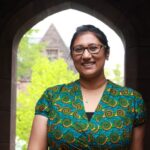Sandy Soils and Earthly (Dis)contents: Plantation Legacies, Agricultural Consciousness, and Environmental Imagination in Fiji – Dr. Ipsita Dey
Posted: 10/17/2024 (CSDE Seminar Series)

When: Friday, Oct 25, 2024 (12:30-1:30PM)
Where: 360 Parrington Hall and on Zoom (register here)
We are looking forward to hosting Ipsita Dey (Comparative History of Ideas, UW) on Friday, Oct. 25th in Parrington Hall 360 and on Zoom. This seminar is co-sponsored by the Population Health Initiative.
In this presentation, Ipsita Dey wil discuss her paper that engages theoretical frameworks in historical consciousness and geographic imaginaries, and introduces and situates the Fiji’s Sigatoka Valley as a “farmscape,” a site where colonial pasts, racial tensions, and climate anxieties are diversely (re)imagined through agriculture. She draws from ethnographic work on an agro-forestry biodiversity conservation initiative at the Sigatoka Sand Dunes National Park (SDDNP) to examine how plantation logics of land distribution and property-defined personhood shape how locals design and envision shared environmental futures. As park rangers, government administrators, and local community members imagine the growth and impact of a “foraging” forest of fruit trees at the border between the SSDNP and the local informal settlement Kulukulu, they reframe the sand dunes area as a site of food secure and self-sufficient futures. This local confidence in soil fertility and agricultural capacity of the sand dunes is, however, in direct contrast to apocalyptic climate change rhetoric, soil sample reports of diminishing nutritional quality, and conservation discourse that frames the sand dunes as a “barren” place. The locals’ (both Indo-Fijian and iTaukei) belief in the agricultural promise of sandy soils reconfigures “barrenness” as a marker of sociocultural disruption (ethnic land disputes), rather than an environmental quality of land. Thus, a boundary which clearly delineates and organizes claims to land between the Park and local residents is essential to imagining political, economic, and ecological possibilities. Even as the liberal logic of the plantation persists, it produces a shared “agricultural consciousness” among Indo-Fijian and iTaukei locals that challenges representations of Fiji as a place that is slowly dying. I argue that sugarcane plantation history shapes both how boundary construction/land claims and agricultural productivity/resilience become the terms of environmental imagination in Sigatoka. In this paper that reveals how and why agricultural development becomes synonymous with Fijian environmental thinking, Dr. Dey positions the Sigatoka Valley as a place of expanding relational possibilities between iTaukei and Indo-Fijians that imagines Fijian futures outside of categorical and agonistic ethnic accounting.
Ipsita Dey is an Assistant Professor in the Comparative History of Ideas Department. She comes to UW Seattle from Princeton University, where she received her PhD in Anthropology. Her work is at the intersection of Pacific Island Studies, Indigeneity Studies, South Asian Diaspora Studies, Environmental Anthropology, and ethnographic ethics. Ipsita’s current book project, “Home on the Fijian Farmscape”, explores how Indo-Fijians articulate connections to land and country through agricultural practice, claiming a complex mode of diasporic nativity in response to resurgent Fijian indigenous ethno-nationalist politics.